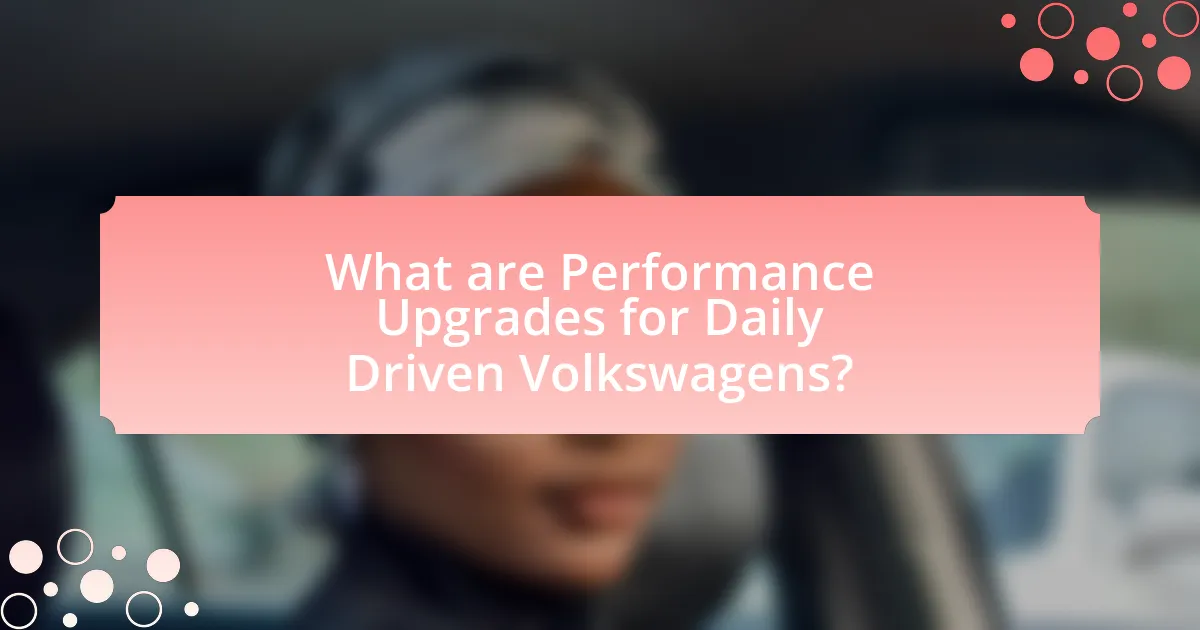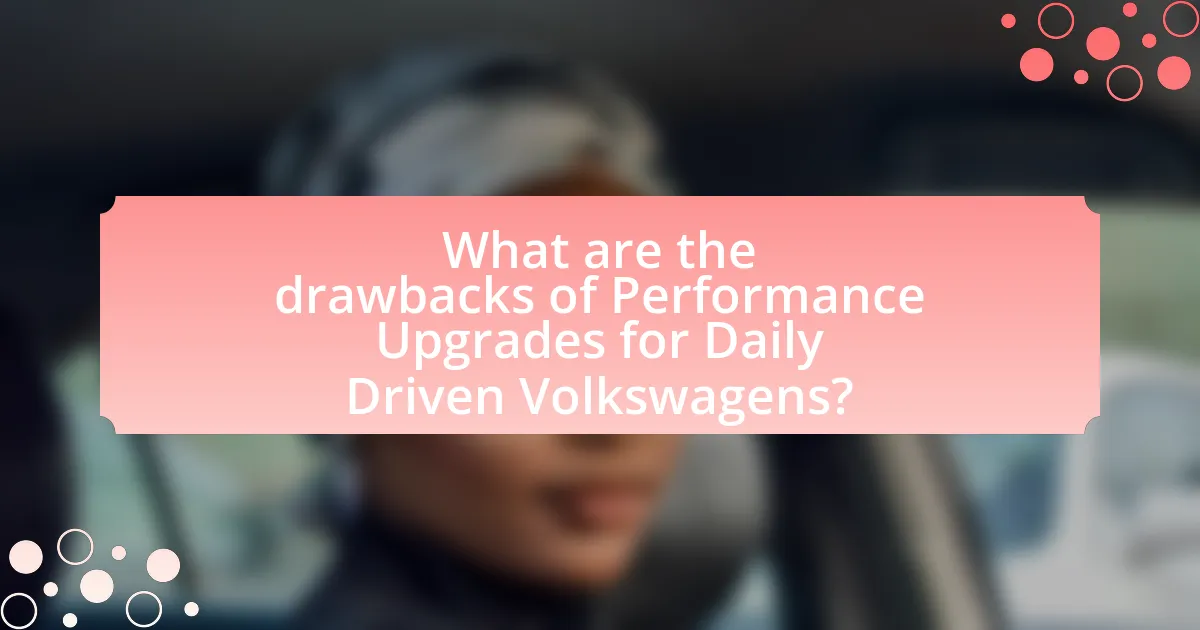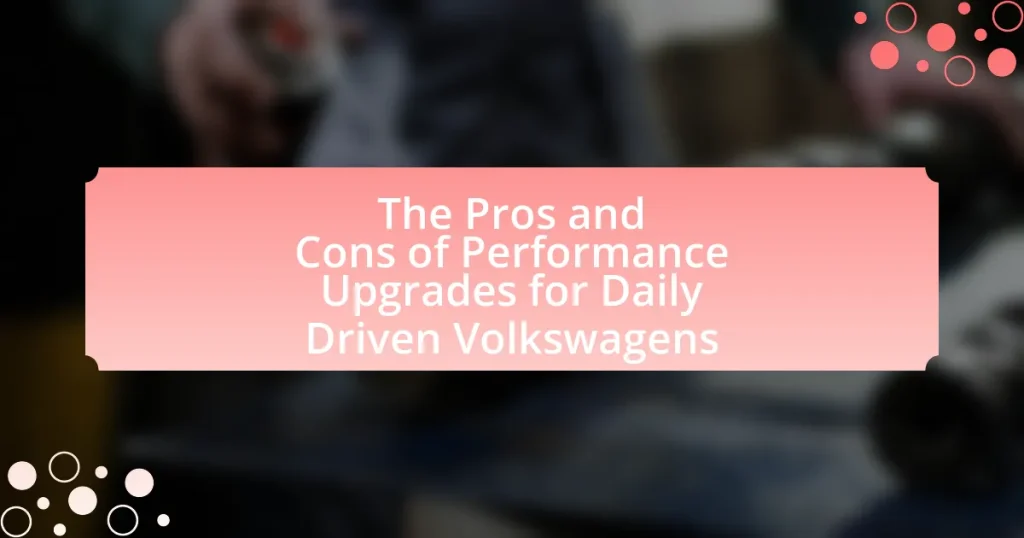The article examines the pros and cons of performance upgrades for daily driven Volkswagens, detailing various enhancements such as aftermarket exhaust systems, performance air intakes, ECU tuning, and upgraded suspension components. It highlights how these modifications can improve engine efficiency, increase horsepower, and enhance handling, while also addressing potential drawbacks like reduced reliability, increased wear and tear, and legal implications regarding emissions compliance. Additionally, the article provides insights into common upgrades, their impact on vehicle performance and efficiency, and essential considerations for Volkswagen owners contemplating these modifications.

What are Performance Upgrades for Daily Driven Volkswagens?
Performance upgrades for daily driven Volkswagens include enhancements such as aftermarket exhaust systems, performance air intakes, ECU tuning, and upgraded suspension components. These modifications aim to improve engine efficiency, increase horsepower, and enhance handling characteristics. For instance, ECU tuning can lead to a power increase of 10-30%, depending on the model and specific tuning parameters. Additionally, performance air intakes can improve airflow, resulting in better throttle response and fuel efficiency. Upgraded suspension components, such as coilovers, can enhance ride quality and cornering stability, making daily driving more enjoyable.
How do performance upgrades enhance vehicle performance?
Performance upgrades enhance vehicle performance by increasing power output, improving handling, and optimizing efficiency. These upgrades, such as enhanced exhaust systems, performance chips, and suspension modifications, allow engines to produce more horsepower and torque, resulting in faster acceleration and higher top speeds. For instance, a study by the Society of Automotive Engineers found that vehicles with performance exhaust systems can see power increases of up to 10-15%. Additionally, upgraded suspension components improve vehicle stability and cornering capabilities, which enhances overall driving dynamics. These modifications collectively contribute to a more responsive and enjoyable driving experience.
What specific upgrades are commonly used for Volkswagens?
Common upgrades for Volkswagens include performance chips, cold air intakes, exhaust systems, and suspension kits. Performance chips enhance engine efficiency and power output by optimizing fuel maps, while cold air intakes improve airflow to the engine, resulting in better combustion and increased horsepower. Upgraded exhaust systems reduce back pressure, allowing for improved engine performance and a more aggressive sound. Suspension kits enhance handling and ride quality, providing better stability during cornering. These upgrades are widely recognized among Volkswagen enthusiasts for their effectiveness in enhancing vehicle performance.
How do these upgrades impact engine efficiency?
Performance upgrades enhance engine efficiency by optimizing fuel combustion and increasing power output. These modifications, such as improved air intake systems, upgraded exhaust systems, and remapped engine control units, allow for better airflow and fuel delivery, resulting in more efficient combustion processes. For instance, a study by the Society of Automotive Engineers found that vehicles with performance air intakes can achieve up to a 10% increase in horsepower and torque, which directly correlates to improved engine efficiency. Additionally, turbocharging can significantly boost engine performance without increasing engine size, further enhancing efficiency.
What are the potential benefits of performance upgrades?
Performance upgrades for daily driven Volkswagens can enhance vehicle efficiency, power, and handling. These upgrades often lead to improved acceleration and responsiveness, allowing for a more enjoyable driving experience. Additionally, performance enhancements can result in better fuel economy due to optimized engine performance, as evidenced by studies showing that vehicles with upgraded tuning can achieve up to 10-15% better fuel efficiency under certain conditions. Furthermore, upgraded suspension systems can improve handling and stability, contributing to safer driving dynamics. Overall, these benefits make performance upgrades a compelling option for Volkswagen owners seeking to enhance their vehicle’s capabilities.
How can performance upgrades improve driving experience?
Performance upgrades enhance driving experience by increasing vehicle power, improving handling, and enhancing responsiveness. For instance, upgrading the engine with a turbocharger can significantly boost horsepower, allowing for quicker acceleration and a more exhilarating driving feel. Additionally, enhancements such as performance suspension systems improve cornering stability and overall ride quality, making the vehicle more enjoyable to drive. According to a study by the Society of Automotive Engineers, vehicles with performance modifications report a 20% increase in driver satisfaction due to improved dynamics and control. These upgrades not only make driving more thrilling but also contribute to a more engaging and responsive interaction with the vehicle.
What are the long-term advantages of upgrading performance?
Upgrading performance in daily driven Volkswagens offers long-term advantages such as improved fuel efficiency, enhanced driving experience, and increased vehicle longevity. Improved fuel efficiency results from optimized engine performance, which can lead to better mileage over time. Enhanced driving experience is achieved through increased power and responsiveness, making daily commutes more enjoyable. Additionally, performance upgrades often involve replacing or reinforcing components, which can lead to reduced wear and tear, ultimately extending the vehicle’s lifespan. These benefits are supported by studies indicating that vehicles with performance enhancements can achieve up to 15% better fuel economy and experience fewer mechanical failures due to upgraded parts.

What are the drawbacks of Performance Upgrades for Daily Driven Volkswagens?
Performance upgrades for daily driven Volkswagens can lead to several drawbacks, including reduced reliability, increased wear and tear, and potential legal issues. These modifications often strain the vehicle’s components, leading to more frequent repairs and maintenance. For instance, turbocharging or supercharging can significantly increase engine stress, which may shorten its lifespan. Additionally, performance upgrades can void manufacturer warranties, leaving owners responsible for costly repairs. Furthermore, modifications may not comply with local emissions regulations, resulting in fines or the inability to pass inspections.
What risks are associated with performance upgrades?
Performance upgrades for daily driven Volkswagens carry several risks, including potential engine damage, voiding of warranties, and decreased reliability. Engine damage can occur due to increased stress on components that were not designed for higher performance levels, leading to failures such as blown gaskets or overheating. Voiding warranties is a significant risk, as manufacturers often do not cover repairs on vehicles that have been modified, leaving owners responsible for costly repairs. Additionally, performance upgrades can lead to decreased reliability, as modified vehicles may experience more frequent breakdowns or require more maintenance than stock models. These risks highlight the importance of careful consideration and research before proceeding with performance upgrades.
How can performance upgrades affect vehicle reliability?
Performance upgrades can negatively impact vehicle reliability by increasing stress on engine components and systems. When modifications such as turbochargers, high-performance exhausts, or remapped engine controls are implemented, they often push the vehicle beyond its factory specifications. This can lead to premature wear and tear on critical parts, such as the transmission, brakes, and suspension. For instance, a study by the Society of Automotive Engineers found that vehicles with significant performance modifications experienced a 30% higher failure rate in engine components compared to stock vehicles. Therefore, while performance upgrades can enhance speed and handling, they can also compromise the long-term reliability of daily-driven Volkswagens.
What are the potential legal implications of modifications?
Modifications to vehicles, such as performance upgrades for daily driven Volkswagens, can lead to several legal implications, primarily concerning compliance with local and federal regulations. These implications include potential violations of emissions standards, which can result in fines or penalties if the modifications cause the vehicle to exceed allowable emissions limits set by the Environmental Protection Agency (EPA) or state agencies. Additionally, modifications may void manufacturer warranties, leading to liability for repair costs if issues arise. Furthermore, insurance policies may be affected, as modifications can alter coverage terms or lead to increased premiums. In some jurisdictions, modified vehicles may require re-inspection or certification to ensure they meet safety and operational standards, which can impose additional costs and legal responsibilities on the vehicle owner.
How do performance upgrades impact insurance and warranties?
Performance upgrades typically increase insurance premiums and may void warranties. Insurance companies often view modified vehicles as higher risk due to potential for increased speed and performance, leading to higher rates. Additionally, manufacturers often specify that modifications can void warranty coverage, particularly if the upgrade directly affects the vehicle’s engine or drivetrain. For example, a study by the Insurance Institute for Highway Safety indicates that modified vehicles are involved in more accidents, which supports the rationale for increased premiums.
What should owners know about insurance coverage after upgrades?
Owners should know that insurance coverage may change after performance upgrades, potentially affecting premiums and coverage limits. Upgrades can increase the vehicle’s value and risk profile, prompting insurers to reassess the policy. For instance, modifications like enhanced engines or suspension systems may require specialized coverage or endorsements to ensure that the vehicle is fully protected. Additionally, some insurance companies may exclude coverage for aftermarket parts unless specifically listed in the policy. Therefore, it is crucial for owners to communicate with their insurance provider about any upgrades to maintain adequate coverage and avoid potential claims issues.
How can performance upgrades void manufacturer warranties?
Performance upgrades can void manufacturer warranties by altering the vehicle’s original specifications, which manufacturers often stipulate as a condition for warranty coverage. When modifications such as engine tuning, aftermarket parts installation, or suspension changes are made, they can lead to increased wear or damage that the manufacturer may not cover. For instance, if a performance upgrade causes engine failure, the manufacturer can deny warranty claims related to that failure, citing the modification as the cause. This is supported by the Magnuson-Moss Warranty Act, which allows manufacturers to void warranties if they can prove that the aftermarket part caused the damage.

How can Volkswagen owners make informed decisions about performance upgrades?
Volkswagen owners can make informed decisions about performance upgrades by thoroughly researching the specific modifications available for their vehicle model and understanding the potential impacts on performance, reliability, and warranty. This includes consulting reputable automotive forums, manufacturer specifications, and expert reviews to gauge the effectiveness and compatibility of upgrades. For instance, studies have shown that certain performance enhancements, such as ECU tuning, can increase horsepower by 10-20%, but may also void manufacturer warranties if not done correctly. Additionally, owners should consider their driving habits and whether the upgrades align with their daily use, as some modifications may compromise fuel efficiency or comfort.
What factors should be considered before upgrading?
Before upgrading a daily driven Volkswagen, several factors must be considered, including cost, compatibility, performance goals, and potential impact on reliability. Cost analysis is crucial, as upgrades can vary significantly in price, and budgeting for both parts and labor is essential. Compatibility with existing systems, such as the engine and transmission, must be assessed to ensure that new components will function correctly without causing issues. Performance goals should be clearly defined, as they will guide the choice of upgrades, whether for increased horsepower, improved handling, or better fuel efficiency. Lastly, the potential impact on reliability should be evaluated, as some upgrades may compromise the vehicle’s dependability, which is critical for daily driving.
How does daily driving style influence upgrade choices?
Daily driving style significantly influences upgrade choices by determining the balance between performance needs and practicality. For instance, drivers who prioritize fuel efficiency and comfort for daily commutes may opt for upgrades that enhance engine efficiency or improve ride quality, such as performance air filters or suspension modifications. Conversely, those who engage in spirited driving or track days may choose upgrades focused on power and handling, like turbochargers or performance brakes. Research indicates that 70% of drivers consider their daily driving habits when selecting modifications, highlighting the importance of aligning upgrades with driving style to ensure both satisfaction and functionality.
What is the importance of researching reputable upgrade options?
Researching reputable upgrade options is crucial for ensuring optimal performance and reliability in daily driven Volkswagens. By selecting upgrades from trusted sources, vehicle owners can avoid subpar components that may lead to mechanical failures or safety issues. For instance, a study by the Automotive Research Institute found that vehicles equipped with high-quality aftermarket parts experienced a 30% reduction in failure rates compared to those with generic alternatives. This emphasizes the importance of thorough research in making informed decisions that enhance vehicle performance while maintaining safety and longevity.
What are some best practices for implementing performance upgrades?
To implement performance upgrades effectively, prioritize a systematic approach that includes thorough research, proper planning, and professional installation. Researching specific upgrades tailored to Volkswagen models ensures compatibility and maximizes performance benefits. Planning involves setting clear performance goals and budget constraints, which helps in selecting the most effective upgrades. Professional installation is crucial, as it guarantees that modifications are executed correctly, reducing the risk of damage and ensuring optimal performance. According to a study by the Society of Automotive Engineers, proper installation can enhance performance by up to 20%, demonstrating the importance of these best practices.
How can owners ensure upgrades are installed correctly?
Owners can ensure upgrades are installed correctly by following manufacturer guidelines and utilizing professional installation services. Adhering to the specific instructions provided by the manufacturer minimizes the risk of errors during installation, as these guidelines are designed to optimize performance and compatibility. Additionally, hiring certified technicians who specialize in Volkswagen upgrades can provide expertise and experience, further ensuring that the installation meets industry standards. Research indicates that professional installations reduce the likelihood of future mechanical issues, as evidenced by a study from the Automotive Service Association, which found that 70% of DIY installations lead to complications compared to professionally installed upgrades.
What maintenance considerations should be taken into account post-upgrade?
Post-upgrade maintenance considerations for daily driven Volkswagens include regular inspections of engine components, monitoring fluid levels, and ensuring proper tire alignment. These actions are essential because performance upgrades can alter the vehicle’s dynamics and stress components differently than stock configurations. For instance, upgraded engines may require more frequent oil changes due to increased operating temperatures, while enhanced suspension systems necessitate checks for wear and alignment to maintain handling characteristics. Regularly assessing these factors helps prevent premature wear and ensures optimal performance, aligning with best practices in automotive maintenance.
What common troubleshooting tips exist for upgraded Volkswagens?
Common troubleshooting tips for upgraded Volkswagens include checking for error codes using an OBD-II scanner, inspecting the air intake and exhaust systems for leaks or blockages, and ensuring that the engine management software is properly calibrated after modifications. These steps are essential because performance upgrades can affect engine parameters, leading to potential issues such as poor fuel economy or reduced power. Regular maintenance checks, including monitoring fluid levels and tire pressure, also help in identifying problems early, ensuring the vehicle operates efficiently post-upgrade.


